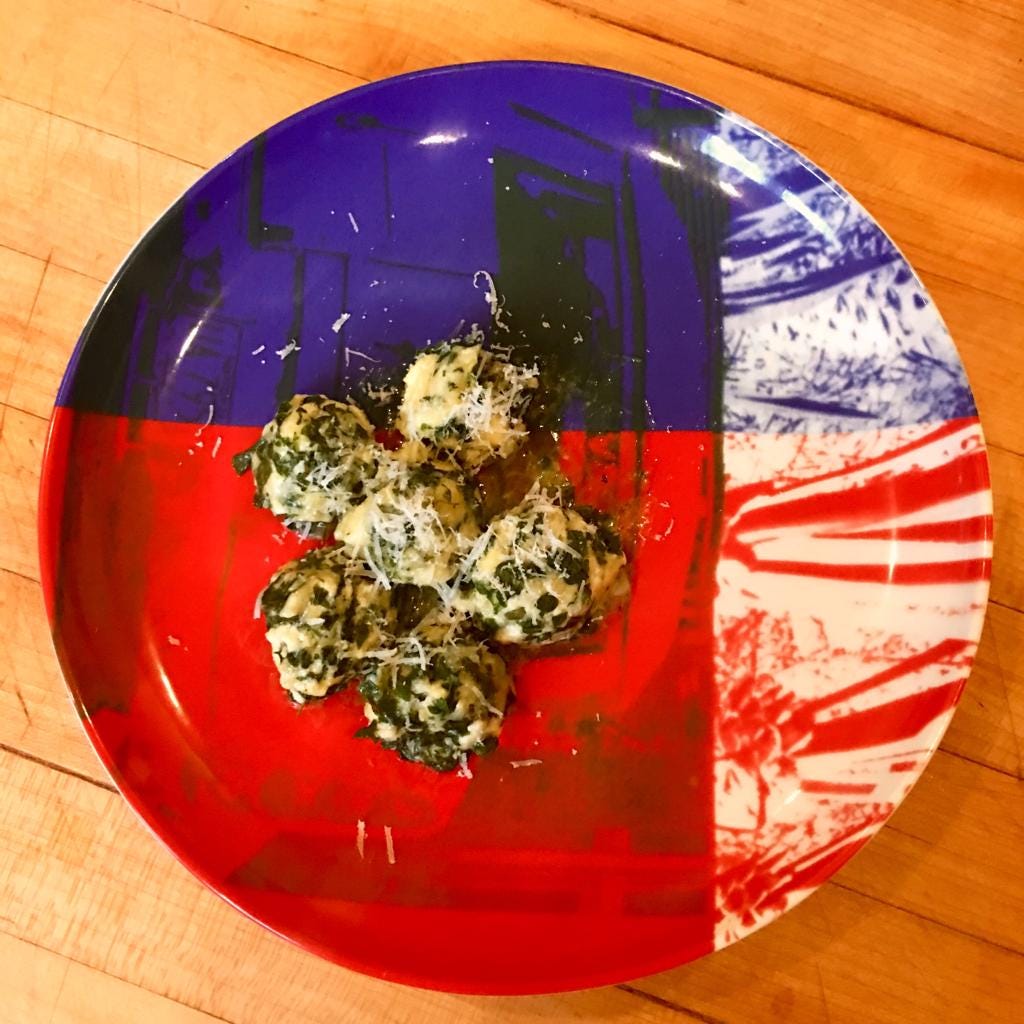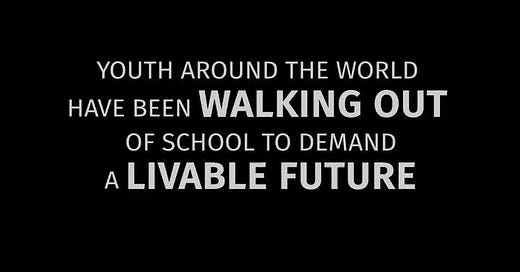Somehow we already have more than 300 subscribers to Sunshine + Microbes! Thank you so much to our readers for your support and feedback. We also just launched a Sunshine + Microbes Facebook page. Give us a follow for food porn, stories we love but can’t fit here, and info on upcoming events like Ferment Fest.
Also we appreciate all the readers who have told us that they've shared Sunshine + Microbes with their friends. Word of mouth is key. And if someone shared this newsletter with you, subscribe here:

When the words “cover cropping” fell from Beto O’Rourke’s lips during last week’s Democratic presidential debate, my heart began to flutter. What a time to be alive! The fact that regenerative agriculture was name-checked in the last two Democratic debates is a hopeful sign for the country’s food system. A lot of environmental action today focuses on simply staunching the bloodletting of plastic, trash, and pollution. But regenerative agriculture — like the practice of cover cropping, where farmers plant non-commodity crops in the off season to add nitrogen into the soil, slow erosion, and crowd out weeds — could actually reverse some of the effects of climate change. This is achieved by sequestering carbon in the soil, so it doesn’t have the chance to drift up into the climate.
The idea behind regenerative agriculture is to grow food in a way that’s beneficial to the environment. Outcomes from practices like cover cropping, no-till farming, agroforestry, and holistic managed grazing can build soil health, clean watersheds, and increase biodiversity.
This is the exact opposite of what most farming operations in America look like. They deplete soil nutrients without replacing them, and then use synthetic fertilizers to mask the fact that the world’s richest soil has been made barren. Then there are the kill-everything-in-its-path pesticides, responsible for the decimation of pollinator populations like bees, whose existence is vital to our own (our food wouldn’t exist without them). And this is how we grow vegetables. The pollution to land, air, and waterways caused by animal agriculture is even more severe.
Ugh. What a bummer, right? But that’s why the resurgence (these buzzy new ideas like cover cropping actually go back millennia) of regenerative agriculture techniques is so exciting. There’s no reason to be chained to the current systems and industries that are wreaking havoc on the planet. I hope these discussions last beyond the debate stage. Before too long, perhaps innovative solutions like regenerative agriculture will become mainstays in policy discussion and agricultural practice.
“Sustainability is bullshit. We need regenerative practices that do something. Do you want a bank account that sustains itself or one that grows?” —Ron Finley, “the Gangsta Gardener,” founder of the Ron Finley Project
love,
Jackie

Reduce, Reuse, Replace
❌Cancelling Amazon Prime*
*Fun fact: Environmentalists’ favorite alliterative phrase “Reduce, Reuse, Recycle” is actually listed in order of importance. Before reusing or recycling purchases, the goal is to reduce consumption to begin with. Here’s an easy way to do that.
Strike SZN is here. Some 50,000 General Motors workers are on strike ✊Some 80,000 Kaiser healthcare workers are planning for October 14 the nation’s largest strike since 1997 ✊And on Friday, the first of two international climate change strikes led by 16-year-old super-activist Greta Thunberg will kick off ✊Among the demonstrators will be more than 1,200 employees from Amazon’s Seattle headquarters — the first strike ever to involve workers at the HQ.
Jeff Bezos’ behemoth monopoly is derided for its aggressive anti-union tactics and reportedly inhumane workplace conditions. But according to the strike’s organizers, the company also has a frustratingly blasé attitude toward climate change. That’s not great for a ginormous logistics company that relies on gas guzzlers (including a recently created fleet of cargo planes) to ship products to customer’s doorsteps. Strikers want the company to stop donating to climate change-denying politicians and lobby groups, to stop courting oil and gas companies for its business and to set a goal of zero carbon emissions by 2030. Amazon has been one of the few multinational corporations that doesn’t track its carbon footprint.


A quick cost-saving way to push back against Amazon’s ever-expanding dominion is to cut ties with the company’s crown jewel Amazon Prime. The dirty little secret about Amazon Prime is that unless it’s used week in and week out, the savings on shipping aren’t worth the price. Nobody needs to unsubscribe right this second. But when it comes time to renew, don’t do it! — and see if you miss the service more than it misses you? (Amazon Prime has twice mysteriously, nefariously signed up Matt again after he cancelled his subscription). Shopping local is ideal, but not everything can be found at the mom and pop around the corner. Need to purchase something from Amazon? It’s no big whoop. Periodically paying for shipping will be cheaper than Prime (and guzzle less gas).
A guide to canceling Amazon Prime.
See the list of sites where you can join the Global Climate Strike on September 20 and 27.
Fresh Links
Our favorite food and environment reads from around the internet. Give’em a read👇
🍅Meet the Man Who Guards America’s Ketchup | NPR
Hector Osorno — the Ketchup Master. For real, that’s his title.
😅Worker Wellness Programs Don’t Really Care About You | The New Republic
Wellness programs peddled by corporate managers sound like a constructive move on the surface. A closer look reveals these plans often are discriminatory (primarily against those with physical disabilities), slyly punitive, and invasive. Here’s how one West Virginia program, run by for-profit Humana, worked:
[The initiative] also included private questions such as: “How much sexual activity do you perform in a week? Is it vigorous?” Anyone who refused to participate was charged an additional $25 per month—up to a $300 yearly burden for workers who were often making less than $47,000 annually, the fifth-lowest salary rate for teachers in the country.”
In other words, these wellness programs are designed to save employers money — not to keep workers healthy. The programs can shame employees and lower office moral while also using nebulous markers to measure health like “acceptable” level of total cholesterol, without “distinguishing between ‘good’ and ‘bad’ types of cholesterol.” Altogether these issues underscore the growing problem Americans have with tying health care to employment.
🏭The Koch Brothers’ Early, Crucial Role in Climate-Change Denial | The New Yorker
Jane Meyer’s review of the new Christopher Leonard book, Kochland: The Secret of Koch Industries and Corporate Power in America highlights just how deviously the Koch brothers (Koch CEO Charles and the recently deceased David) used their billions to push a climate denial narrative in the country.
Leonard’s deeply researched book mostly hones in on the company’s business practices. However, it was the business of sowing discontent and confusion about the factual realities of climate change that allowed their corporation to thrive by sabotaging government plans to reduce fossil-fuel consumption for decades. They bought off politicians and turned a scientific consensus into a political “debate” that now seems never-ending.
If nothing else, the Kochs’ role in building climate change inaction is a reminder that denial mostly exists to line the pockets of the rich who aren’t interested in sharing their billions or, really, the planet with the rest of us.

RECIPE: Moringa Ricotta Gnocchi

Gnocchi (pronounced nyoki) are little Italian dumplings that scratch the same hearty itch as pasta. Usually made with potatoes and flour, this spin is greener and much cheesier. Feel free to include any greens you like. I used rainbow chard and moringa, which is all the rage right now for its dense nutrition.
We have a few trees on the property, and as it’s a challenge to get ahold of local greens during the summer, I’ve been playing around with the “miracle tree.” De-stemming the tiny leaves can feel tedious, but there’s no need to be a perfectionist. Particularly when cooked, the thin stems won’t be noticeable. Here’s one of my favorite ways to feature moringa.
Ingredients
1-2 lbs de-stemmed moringa (Or any big bunch of local greens. If using hearty greens like kale or chard, quickly boil them to soften them up)
Small bunch of herbs of choice (optional)
A few tablespoons of butter
About 3 cups ricotta
About 3 cups finely grated parmesan
1/4 cup flour of choice
3 egg yolks
A few fresh gratings of nutmeg, or a pinch if already ground
Salt and pepper
Step-by-step
Melt butter in a pan over medium heat and sauté greens. Let them cool and squeeze out any liquid.
If using a food processor, roughly chop the greens. If mixing by hand, finely chop.
Place all ingredients in a food processor and pulse until just combined. Or mix it all up by hand.
Dunk your hands in some flour, take a pinch of the gnocchi mixture (about a tablespoon, but feel free to go larger; larger gnocchi are called gnudi) and roll into a ball. Repeat with the remainder of mixture.
Freeze on a cookie sheet if not cooking gnocchi immediately. To cook, bring a pot of water to boil. Salt generously and add the gnocchi. They are ready when they float to the surface, after about 2-3 minutes.
Serve with melted butter and freshly grated parmesan, or sauce of choice.

Like we said at the top of this issue: What a time to be alive! 🌭
Talk to Us
Send in your comments, mailbag questions, recipe mishaps, or cooking tips: sunshineandmicrobes@gmail.com. Also do us a favor and follow us on Facebook and Instagram.
If you enjoyed this email, please share it with others. If someone forwarded this to you, click the button to sign up:
-------------------------------------------------------------------------------------------------
Sunshine + Microbes team
Jackie Vitale is the current Chef-in-Residence at the Robert Rauschenberg Foundation and co-founder of the Florida Ferment Fest. Her newsletter explores the intersection of food, culture, environment and community.
Matt Levin is a freelance reporter based in Colombia. He edits Sunshine + Microbes and contributes other scraps to each issue.






